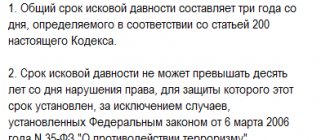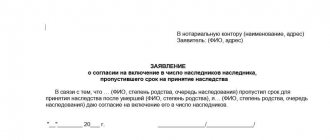Author
Sergey Ershov
Registration number in the register of lawyers of St. Petersburg – 78/5563
A few years after your father’s death, you learned that not all of his property was included in the inheritance. The real estate and cars he acquired in another marriage were registered in the name of his stepmother. You understand that you have been cheated, and you are even determined to resolve the issue in court. The problem is one thing - you don’t know what the statute of limitations is for inheritance.
I will tell you during what period the heirs can file a claim, which claims are subject to the statute of limitations and which are not. You will also find out in what cases it can be restored/extended and when the court has the right to refuse to consider an application due to missing a deadline.
What is the statute of limitations on inheritance?
The statute of limitations for inheritance is a period established by law for the protection and restoration of violated rights of heirs. The implementation of this mechanism is carried out exclusively by filing a statement of claim in court. It begins to flow only after rights have been violated or obstacles to their implementation have appeared.
In the article, I combined the most important points related to determining the beginning of the period, suspension and restoration of the limitation period, and also provided the nuances of the calculation, taking into account those given in Chapter. 12 of the Civil Code of the Russian Federation rules.
What is the general statute of limitations for inheritance?
All actions to accept an inheritance, determine the circle of heirs, divide property between them and protect their violated rights must be carried out within the time limits established by law. The general period for filing an application is 3 years from the day the person knew or should have known - Art. 196 Civil Code of the Russian Federation:
- About violation of your right.
- About who is the proper defendant in a claim for the protection of this right.
These rules apply to almost all claims arising from inheritance legal relations, including:
- On determining the circle of heirs and recognition as an heir.
- On the inclusion of property in the inheritance mass and its exclusion.
- On reclaiming property from someone else's illegal possession.
- On establishing a mandatory share.
- On recognizing heirs as unworthy and removing them.
- On recognizing an insignificant will as invalid.
- On the collection of debts of the deceased from the heirs.
- On recognition of the right of ownership of property - provided that the plaintiff’s right arose for the first time.
- On the division of inheritance and redistribution of shares - if the dispute concerns illegally hidden or not included in the inheritance mass of property.
- On determining the marital share of former spouses in inherited property - if after the divorce the property was not divided.
Related article:
How to be recognized as an unworthy heir in 2021 - instructions
What is the limitation period
If there are valid reasons, the period may be extended. However, it cannot exceed 10 years from the date of violation of the right for the protection of which it was established - Art. 196 of the Civil Code of the Russian Federation. This rule was introduced to provide additional guarantees to the rights of defendants.
Attention! 10 years do not apply to those claims that are not subject to the statute of limitations.
Related article: How to enter into an inheritance if more than 10 years have passed without a valid reason in 2021 - step-by-step instructions
What are the special limitation periods for inheritance?
Most probate claims can be brought within the statutory 3 years. However, there are also special deadlines established for the following claims:
- On the restoration of the deadline for accepting an inheritance - no later than 6 months from the day when the reasons preventing timely contact with a notary no longer exist.
- On the heir's priority right to indivisible property during division - within 3 years after death without a will and if there is one.
- On invalidation of a contested will and refusal of inheritance. And also on the application of the consequences of the invalidity of these contestable transactions - 1 year from the date of announcement of the will or from the day when the plaintiff learned or should have learned about the reasons for recognizing these documents as invalid.
- On the invalidation of a void will/renunciation of inheritance and on the application of the consequences of their invalidity - 3 years from the date of announcement.
On a note. Heirs often misinterpret the concept of “limitation period,” confusing it with the deadline for accepting an inheritance or for filing a lawsuit to restore the missed period for entry.
In the article I will tell you about these points, so that it is easier for you to understand all the nuances.
What claims are not covered by the statute of limitations?
There are no time limits for going to court if you are making a demand to establish a fact of legal significance, namely:
- Acceptance of inheritance.
- Dependents.
- Family relationship with the testator.
- Confessions of paternity, etc.
The heirs file a claim in court for recognition of the right of ownership in connection with the actual acceptance of the inheritance indefinitely, provided that:
- Other applicants did not claim inheritance rights.
- The ownership of the inheritance has not been registered to anyone.
- You were forced to go to court by some violation that requires filing a claim for recognition of the right. And at the same time, you are the actual owner of the deceased’s property and continue to use it.
Also, legal successors by law and by will may at any time make the following demands - Art. 208 Civil Code of the Russian Federation:
- On the protection of personal non-property rights and intangible benefits. Those. on the protection of copyright, the right to remuneration and the right to follow, the right to a trademark, to obtain a patent, to restore its validity, etc.
- To the bank about issuing deposits and collecting interest for the use of other people's funds.
- On eliminating violations of the rights of the owner or another possessor, even if these violations were not associated with deprivation of possession.
- On challenging regulatory legal acts - for example, a notary’s refusal to issue a certificate of the right to inheritance to an heir who accepted it in a timely manner.
How to calculate the limitation period
The calculation and application of the limitation period in inheritance disputes is one of the complex legal aspects. And the day of opening of the inheritance (the day of death of the testator, recorded in the death certificate or in the court decision declaring him dead) is not always the beginning of this period. Therefore, I will try to “sort everything out.”
From what moment does the countdown begin?
In disputes about inheritance, the beginning of the term is considered to be the day when the heir meets under the combination of the following conditions - clause 1 of Art. 200 Civil Code of the Russian Federation:
- Learned or should have learned about a violation of your rights.
- I also found out who is the proper defendant in the lawsuit to protect this right.
When determining this day, the following nuances should be taken into account:
- If the plaintiff learned about the violation of his right not on the day of its violation, but at a later moment, he must prove this circumstance. The fact that a person has already learned about a violation of his rights may be evidenced by documents or testimony of witnesses.
- The expression “should have known” means that there is no direct evidence that the plaintiff knew, but under certain circumstances it simply could not have been otherwise.
- The proper defendant is the person who violated the rights of the plaintiff or is a participant in the disputed legal relationship. Such persons may be other citizens, other heirs, a notary, the state represented by a local government body, the Federal Property Management Agency or the tax authority.
- Courts considering disputes arising from inheritance legal relations usually rule that the plaintiff himself must take measures to clarify the issue of the proper defendant.
- If the defendant turns out to be improper, the court may allow his replacement to be proper. Only after such a replacement, preparation and consideration of the case are carried out from the very beginning.
- The plaintiff has the right to declare disagreement with replacing the improper defendant with another person. Here the court must consider the case based on the claim.
What are the rules for calculation?
These rules are as follows - Ch. 11 Civil Code of the Russian Federation:
- The countdown starts from the next day after the occurrence of the event that determines the beginning of the period.
- If the term is calculated in years, then it expires on the corresponding month and date of the last year of the term.
- If the last day of the term falls on a holiday/non-working day, the end date will be the nearest working day.
- The period ends from the date of application to the court for protection of the violated right. Such a day is the day of filing a statement of claim in court (including on the Internet) or its acceptance by a postal organization.
- The flow is suspended when a state of emergency occurs, the plaintiff is in the armed forces under martial law and other circumstances - Art. 202 of the Civil Code of the Russian Federation.
How does the statute of limitations apply?
The expiration of the time limit is a basis for refusing a claim, but only if the defendant declares this.
The heirs have the right to go to court even if the statute of limitations has long expired. In such a situation, the rules apply - Art. 199 Civil Code of the Russian Federation:
- The court is obliged to accept the application regardless of the expiration of the deadline.
- The court can apply the limitation period only upon the application of a party to the dispute.
- Statements by third parties (the wrong party) about expiration are not grounds for dismissal of the claim.
- The expiration of the limitation period at the request of the other party is an independent basis for refusal of the claim. Those. the court does not need to examine other circumstances of the dispute.
Is it possible to restore the term by inheritance?
General and special terms can be restored in exceptional cases - for objective, valid reasons. The burden of proving their validity rests with the person bringing the claim.
Circumstances related to the personality of the person applying for the restoration of the term of the heir are considered valid - Art. 205 Civil Code of the Russian Federation:
- Serious illness.
- Helpless state.
- Illiteracy.
- Others - the list is open.
Important! The reasons for omission must have occurred within the last 6 months of the statute of limitations. The limitation period of 10 years is the limit and cannot be restored, but the rule applies provided that the other party to the dispute has declared its expiration.
Requirements for a will
The law imposes special requirements for making a will. If the form and (or) certification of the will is violated, it loses its legal force and cannot be used to inherit property.
The Civil Code provides for 4 types of wills:
- inheritance agreement or will (Part 1 of Article 1118 of the Civil Code of the Russian Federation);
- joint will of the spouses (Part 4 of Article 1118 of the Civil Code of the Russian Federation);
- closed will (Article 1126 of the Civil Code of the Russian Federation);
- a will in emergency circumstances (Article 1129 of the Civil Code of the Russian Federation).
Each of them has its own specific shape. But for most, the following requirements apply.
- The document must be certified by a notary or another person authorized by law. This requirement also applies to a will in an emergency, provided that the maker survives and the threat to his life has passed.
- The will must indicate the date and place of drawing up the document, information about the testator and heirs.
- Information about the inheritance must be available. You can transfer by inheritance not only existing real estate, rights, and other valuables, but also property that the testator intends to acquire in the future.
- The document is signed by the testator personally. If, due to objective reasons, he cannot sign the will with his own hand, a trusted person does this for him in the presence of witnesses.
How to calculate the statute of limitations when entering into an inheritance
The deadline for claiming rights to inherited property is 6 months from the date of death of the testator. During this period, all applicants for inheritance, both by law and by will, should contact a notary or take steps to actually accept the inheritance.
For some categories of heirs, this time period may shift. Read more about basic and special deadlines in the article “What is the deadline for entering into inheritance in 2021 according to the law of the Russian Federation - a detailed answer.”
If you were unable to meet the legal time frame, the notary will not include you among the heirs and will refuse to perform the notarial act. This means that the rights to the deceased's property will pass to other heirs and your share will be divided between them.
In what period to file a claim for restoration of the missed deadline?
The law provides for the opportunity for late applicants to restore the missed deadline in court - Art. 1155 of the Civil Code of the Russian Federation. You need to file a claim demanding that the deadline be restored and prove the valid reasons for which it was missed.
Important! To file a claim, you will have only 6 months from the moment the circumstances excluding the possibility of contacting a notary cease. If this time has expired, recovery will be impossible.
See also:
How to restore the inheritance deadline in 2021 - step-by-step instructions
How to enter into an inheritance after 6 months in 2021 - step-by-step procedure
What is the limitation period for establishing the fact of acceptance of inheritance through court?
If you are a qualified heir by will/by law and actually used the property of the deceased and performed the duties of the owner, then you have the right to contact a notary at any time. There is no time limit by law to provide him with evidence of your actual acceptance of the inheritance and to submit an application for a certificate.
When a notary considers the evidence unconvincing and refuses to issue you a certificate, you will have to go to court with a request to establish the fact:
- Acceptance of inheritance - the case will be considered in a special proceeding and the statute of limitations is not applicable in this case.
- Acceptance of inheritance and recognition of ownership rights in relation to property received by inheritance - the general limitation period applies, i.e. you will have at least 3 years, but no more than 10 years (position of the RF Armed Forces).
The legislative framework
The statute of limitations begins when a citizen learns that he is entitled to an inheritance or should have known about it. The period is 3 years. If the heir did not know about the inheritance matter at that time, this does not mean that his right to the testator’s property is lost. Regardless of the period of application, the heir who has valid reasons for his absence has the right to a part of the inheritance. The reasons for his absence must be documented.
In the Code of Civil Procedure Art. 196 introduced an amendment to the statute of limitations, according to which the limitation period is limited to 10 years.
What nuances to pay attention to when determining the limitation period?
The statute of limitations for inheritance legal relations begins to run after the opening of the inheritance, i.e. they are counted unambiguously after the death of the testator. If the plaintiff learned about the violation of his rights not on the day the inheritance was opened, but later, the countdown begins from that moment.
But when determining the beginning of the flow, there are still a lot of nuances. I’ll tell you about them further.
From what moment is the term calculated for violation of the rights of minors and incompetents?
The beginning of its course is the day when I learned (should have known) about the violation of the rights of a minor or incapacitated heir and about the proper defendant in the claim:
- His legal representative.
- Conscientious representative - in case the legal representative improperly performed his powers.
- The heir himself - subject to the emergence or restoration of full legal capacity.
On a note. The Supreme Court of the Russian Federation concluded: “A child, due to his age, cannot understand the importance of the requirements established by law, and the inaction of his mother/father/guardian should not affect the interests of the minor.”
How to determine the statute of limitations for challenging a will
To challenge the will, you have only 1 year.
To challenge/invalidate the will, from the moment it was announced or from the day the plaintiff learned (should have known) about the circumstances for invalidating the transaction, the following deadlines apply:
- For voidable wills, i.e. committed under the influence of delusion, deception, violence, threat and if the competent testator did not understand the significance of his actions and could not direct them - 1 year.
- For claims related to the consequences of recognizing a contested will as invalid, incl. return of everything received - 1 year.
- For void wills made in violation of the requirements of the Civil Code of the Russian Federation regarding the identity of the testator, the procedure for drawing up, the form, content, and certification - 3 years.
- For claims related to the consequences of declaring a void will invalid, incl. distribution of the testator's property among the heirs according to the law - 3 years.
Related articles:
How to challenge a will in 2021 - step-by-step instructions
What you need to know about the limitation period for real estate inherited by law and by will
For inheritance disputes, the subject of which is real estate (land plots, houses, apartments, dachas, buildings and structures), the general limitation period is most often applied - 3 years. For good reasons, this period can be extended, but it is unacceptable to exceed 10 years from the date of violation of the right.
For real estate, all the rules set out in the previous sections for calculating and applying the limitation period apply. Also pay attention to some nuances:
- Its course does not depend on the basis of inheritance, i.e. it does not matter whether the property has passed or should pass to you by law or by will.
- It depends on the requirements stated in the claim - a general period of 3 years or a special one can be applied (for example, for declaring a contested will invalid - 1 year).
- Does not apply to the requirements listed in Art. 208 of the Civil Code of the Russian Federation, incl. to a statement of claim by the owner or other holder of real estate to eliminate any violations of his rights.
- There is no statute of limitations if the claim is not related to deprivation of possession of real estate, but only a registered right is disputed.
- For claims for recognition of ownership rights aimed at ensuring that the right arose for the first time for the plaintiff (i.e., the plaintiff is not the owner of the property), a general period of 3 years applies.
- It is applied by the court only upon the application of a party to the dispute.
What is the statute of limitations for claims for division of property and allotment of shares?
If the heirs fail to reach an agreement on the method and conditions for dividing the common property or allocating a share to them, they have the right to go to court. The limitation period applies only if the rights of the heir are violated or if there are obstacles to their implementation.
Thus, statute of limitations does not apply to demands for the allocation of a share - inheritance rights have already been realized, and the impossibility of allocating a share due to a missed deadline would mean a limitation of the rights of the owners.
If, as a result of the division, one of the heirs received more property than the size of their allotted share, the discrepancy is eliminated not by reviewing the share in court, but by compensation.
On a note. When dividing inherited property, the heir can use his preemptive right to indivisible things, household furnishings and household items. But this should be done within 3 years from the date of opening of the inheritance, since later he will be deprived of this right.
If the dispute concerns illegally hidden or not included in the estate, the general period is 3 years from the day the plaintiff learned about the violation of the right and about the defendant in the case.
What is the deadline for allocating the marital share through the court?
The statute of limitations does not apply to cases involving the allocation of a marital share in property jointly acquired with the testator and the recognition of ownership of this share by the surviving spouse. This requirement relates to requirements to eliminate violations of rights not related to deprivation of possession under Art. 208 Civil Code of the Russian Federation.
On a note. The joint ownership regime applies to all property acquired during marriage, even if it was registered in the name of one of the spouses or if one of the spouses did not have their own income for good reasons (for example, running a household).
If the marriage was dissolved and after the divorce the property was not divided, then the general limitation period of 3 years applies to claims for the division of common property. The starting point will not be the date of termination of the marriage relationship, but the day when the surviving spouse learned (should have) learned about the violation of his right.
What is the limitation period for collecting debts of the testator from his heirs?
To submit a claim for debt collection, 3 years are allotted from the date of delay.
This period is calculated according to the general rule and is 3 years not from the date of death of the testator, but from the moment the delay occurred. It is not subject to interruption, suspension or restoration - Art. 1175 of the Civil Code of the Russian Federation.
The arrears of alimony and payment of penalties arising due to the fault of the testator are transferred to the successor who accepted the inheritance, within the value of the inherited property transferred to him - clause 10 of the Review of Judicial Practice of the Supreme Court of the Russian Federation No. 4. The limitation period is calculated separately for each overdue monthly payment.
Important! If you, being an heir and acting as a defendant in the case of collecting the debts of the testator, do not declare in court that the statute of limitations has expired, the court is obliged to consider the claim, and most likely you will have to pay for the inherited obligations.
The limitation period does not apply to claims against heirs for compensation for damage caused by the testator to the life or health of another person, as well as for moral damage caused.
Which court to file a claim in?
Inheritance disputes are considered by courts of general jurisdiction. A statement of claim filed in the wrong court is subject to return - Art. 135 Code of Civil Procedure of the Russian Federation. In this case, the judge will issue a ruling in which he will indicate to the applicant which court he needs to apply to.
Claims arising from inheritance legal relations are brought to court:
- At the place of residence of the defendant-citizen or at the location of the defendant-organization (its branch, representative office) - Art. 28 Code of Civil Procedure of the Russian Federation. This is a general rule.
- If the place of residence is unknown or the defendant does not live in Russia, then at the location of his property or his last known place of residence in the Russian Federation - Art. 29 Code of Civil Procedure of the Russian Federation.
- When establishing the facts of ownership and use of real estate (land plots, subsoil, buildings, residential and non-residential premises, structures, structures) - at the location of these objects, Art. 30 Code of Civil Procedure of the Russian Federation.
- When the inheritance includes several real estate objects and they are located in different areas, then at the location of one of them at the place of opening of the inheritance - clause 3 of the RF Armed Forces Regulation No. 9.
- If out of several real estate objects none is located at the place of opening of the inheritance, then at the location of one object at the choice of the plaintiff - clause 3 of PP RF Armed Forces No. 9.
On a note. Even if you bring a claim in violation of the rules on jurisdiction, this fact will not affect the statute of limitations.
Application
A complete list of grounds for refusal to accept a statement of claim is contained in Article 134 of the Code of Civil Procedure of the Russian Federation. Moreover, among them there is no reason related to the expiration of the statute of limitations. Thus, missing the appropriate period is not a reason for returning the claim to the applicant and an obstacle to considering the case on the merits.
However, defendants have the right to declare the expiration of the limitation period by putting forward a motion or indicating this in an objection to the statement of claim. Upon receipt of a corresponding petition, the judge terminates the proceedings without satisfying the claims.
Attention! You can file a motion to apply the statute of limitations at any stage of the legal process.
Remember
- The statute of limitations for inheritance is a period established by law for judicial protection and restoration of violated rights.
- Most claims are filed within the general period - within 3 years from the moment the person knew or should have known about the violation of his rights and about the proper defendant in the claim.
- The limitation period can be extended if the reasons for the omission are proven valid, but it cannot be more than 10 years from the moment the person learned of the violation of his rights.
- A special period (preventative, i.e., not subject to restoration in case of omission) is established for submitting demands for restoration of the period for accepting an inheritance - 6 months from the date of termination of the reasons for omission.
- A special limitation period applies to claims to invalidate a contested will/renunciation of inheritance - 1 year from the date of announcement or from the day the plaintiff learned of the reasons for such a statement.
- The moment the flow begins depends on the requirements and the circumstances of the case.
- Does not apply to requirements for establishing facts of legal significance, for recognition of property rights in connection with the actual acceptance of an inheritance and does not apply to those listed in Art. 208 of the Civil Code of the Russian Federation requirements.
- There is no statute of limitations when allocating a marital share and recognizing the surviving spouse's right of ownership to this share.
- Demands for the allocation of a share of the heir after the division of the inherited property and demands for recovery of damage and moral harm caused by the testator may be filed indefinitely.
- Even if the deadline for filing a claim in court has long expired, the court does not have the right to refuse to accept the application and consider the case. A refusal can only be issued upon the application of the other party to the dispute.









